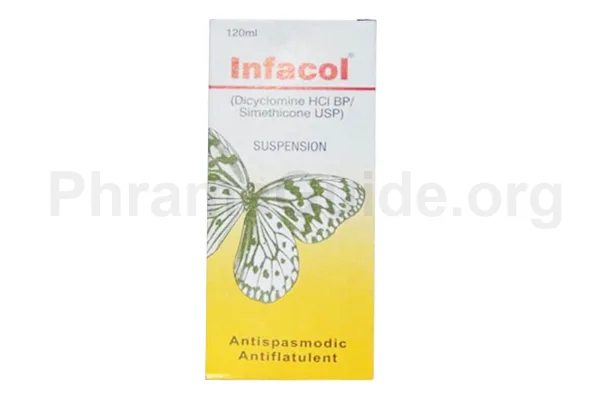Infacol syrup is a combination medication primarily used to treat gastrointestinal discomfort and symptoms in children. It is an over-the-counter medication that helps to relieve the symptoms of colic in babies. The following are some common uses and indications of Infacol Syrup:
- Colic: Ifacol syrup can be used to provide relief from colic in infants, which is characterized by excessive crying and fussiness due to gastrointestinal discomfort.
- Irritable Bowel Syndrome (IBS): The use of Infacol syrup can help manage symptoms of irritable bowel syndrome in children, including abdominal pain, cramps, and bloating.
- Gastrointestinal Spasms: Infacol syrup’s antispasmodic properties make it useful for relieving gastrointestinal spasms and cramps, which can occur in various conditions.
- Gas and Bloating: Infacol syrup’s antiflatulent helps reduce gas bubbles, which can alleviate symptoms of bloating and discomfort caused by trapped gas.
- Digestive Discomfort: Infacol syrup can be used to provide relief from general gastrointestinal discomfort, such as abdominal pain or cramping.
- Improving digestion: Infacol syrup can help to improve digestion by breaking down food particles and making them easier to digest.
- Preventing constipation: Infacol syrup can help to prevent constipation by making stools softer and easier to pass.
Off-label Uses of Infacol Syrup
- Functional Abdominal Pain: Functional abdominal pain refers to recurrent or chronic abdominal pain in children without an underlying organic cause. Infacol may be considered off-label for managing abdominal discomfort associated with functional abdominal pain.
- Gastrointestinal Spasms: Infacol syrup may be considered for off-label use in treating gastrointestinal spasms in children, especially in cases where other treatments have been ineffective or are not suitable.
- Gastroesophageal Reflux Disease (GERD): Infacol syrup may be used off-label to alleviate discomfort and spasms associated with GERD in children.

What is Infacol?
Infacol Syrup is a combination of Dicyclomine + Simethicone, manufactured and marketed by Spencer Pharma, Pakistan.
Infacol : Available Formulations and Strengths
Presently, Infacol is available in Syrup and Drop forms.
Infacol Syrup:
- Dicyclomine (HCl): 5mg/5ml
- Simethicone: 50mg/5ml
Infacol Drops:
- Smithicone: 40mg
Who Should Not Use Infacol?
Infacol Syrup is generally well-tolerated, there are certain situations or conditions where the use of Infacol may not be recommended.
- Infacol syrup should not be given to babies who are allergic to simethicone and dicyclomine.
- Infacol syrup should not be given to babies who have a bowel obstruction or other serious medical conditions.
- Infacol syrup may interact with some medications, such as antibiotics. If you are taking any other medications, you should talk to your doctor before giving Infacol syrup to your baby.
- Infacol syrup is not recommended for use in neonates (newborns) and premature infants due to the risk of serious adverse effects.
Recommended Daily Dosage of Infacol Syrup
Infacol Dose for Infants (under 6 months): (Infacol Drops)
- 0.5 ml (10 Drops) is given before each feed.
Infacol Syrup Dose for Children (6 months to 2 years):
- 2.5 ml (half teaspoon) is given before each feed.
Infacol Syrup Dose for Children 2 years to 12 years:
- 5 ml (one teaspoon) is given before each feed.
How Infacol Works?
Infacol syrup is a combination of two active ingredients and here’s how each ingredient works:
- Dicyclomine (Antispasmodic Action):
- Dicyclomine is an antispasmodic medication that belongs to a class of drugs known as anticholinergics. It acts by blocking the action of a neurotransmitter called acetylcholine at certain receptors (muscarinic receptors) in the smooth muscles of the gastrointestinal tract.
- Smooth muscles are responsible for the rhythmic contractions that move food and waste through the digestive system. In conditions such as irritable bowel syndrome (IBS), these muscles may contract excessively, leading to pain, cramps, and discomfort.
- Dicyclomine’s antispasmodic action helps relax the smooth muscles, reducing muscle contractions and spasms. This can lead to relief from abdominal pain, cramps, and discomfort associated with gastrointestinal spasms.
- Simethicone (Antifoaming Action):
- Simethicone is an antifoaming agent that works by reducing the surface tension of gas bubbles in the gastrointestinal tract. Gas bubbles can become trapped in the digestive system, leading to bloating and discomfort.
- By lowering the surface tension of gas bubbles, simethicone helps break them down into smaller bubbles that are easier to expel. This can alleviate the sensation of bloating and discomfort caused by trapped gas.

Leave A Comment